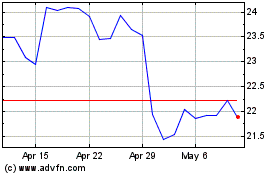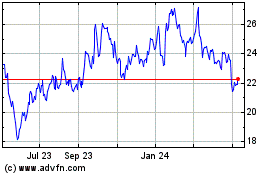By Alistair MacDonald
This article is being republished as part of our daily
reproduction of WSJ.com articles that also appeared in the U.S.
print edition of The Wall Street Journal (February 27, 2020).
Two of the world's largest investment funds have begun selling
down stakes in coal miners citing environmental concerns, leaving
shares of some of the companies concentrated in the hands of a few
large U.S. investors.
As big fund managers amend what they call their ethical
investment policies, analysts say more selling could follow.
In recent weeks, Norway's trillion-dollar sovereign-wealth fund,
Norges Bank, and French giant BNP Paribas Asset Management have
sold shares in companies that mine thermal coal, including Anglo
American PLC. A few large funds, including Vanguard Group and
Dimensional Fund Managers, now have outsize holdings in many
smaller coal-mining companies.
Other large investors are assessing their own policies for
thermal coal or extending current ones. Thermal coal is considered
one of the biggest contributors to climate change by many
scientists.
"Even if funds don't have these restrictions today, do they want
to have these problems going forward?" said Ben Davis, a mining
analyst at Liberum.
Norges Bank won't invest in companies that extract more than 20
million metric tons of thermal coal a year or maintain coal-power
capacity of more than 10,000 megawatts. On Monday, it sold another
large slice of Anglo's shares, reducing its stake to 1.38% from
2.42% at the end of last year, according to FactSet.
BNP Paribas Asset Management, which has more than $490 billion
under management, recently began selling shares in companies that
derive more than 10% of their revenue from mining thermal coal, a
spokesman said.
BlackRock Inc., by virtue of being the world's largest money
manager, is a major investor in thermal-coal miners and utility
companies. Larry Fink, its chief executive, said the company's
actively managed debt-and-equity portfolios will move away from
thermal coal this year as the sector's exposure to increased
regulation makes it less economically viable.
BlackRock also said it would closely scrutinize other businesses
that are heavily reliant on thermal coal as an input.
Still, the impact will be muted. BlackRock's index-tracking
funds can still hold such stocks, and its smaller active-management
business will only exit companies that generate more than 25% of
their revenue from thermal-coal production.
Diversified giants such as Anglo and Glencore PLC should be
exempt from the firm's limitations. Coal miners such as Arch Coal
Inc. and Whitehaven Coal Ltd. -- of which BlackRock owns 7.4% and
5%, respectively -- are less secure.
BlackRock also isn't divesting shares of coal-powered utilities.
It owns stakes of more than 5% in American Electric Power Co., Duke
Energy Corp. and Southern Co.
An ongoing danger for miners and utilities, analysts say, is
that fund managers with no current restrictions on coal won't want
to risk owning such companies in case their firm's environmental,
social and governance policies change.
U.K.-based Aviva PLC has already sold its shares in 17 companies
that drew more than 30% of their revenue from thermal-coal power
generation or mining. But the fund is looking at going further by
focusing on how much coal companies mine or use, rather than just
portion of revenue, according to a spokesman.
A handful of funds hold outsize positions in certain coal miners
and utilities. Vanguard, BlackRock and Dimensional together own
almost 24% of the share capital of Arch Coal, for instance. A unit
of Invesco, another fund that cites its environmental credentials,
owns a further 21% of the St. Louis-based miner.
A spokeswoman for Invesco said the company supports the move
away from carbon-based fuels to more sustainable forms of energy
but declined to comment further.
"Vanguard is deeply concerned about the long-term impacts of
sustainability risks, such as thermal coal producers," a
spokeswoman for the fund said.
A spokesman for Dimensional said that some of its funds take
into account environmental factors such as climate change.
For Vanguard and BlackRock, it isn't clear how much of their
holdings in coal companies are in index trackers.
Coal miner Peabody Energy Corp. estimates that much of the
nearly 12% stake these funds own in the company is in index
trackers.
Dimensional owns a further 5.3% of Peabody, while activist
investor Elliott Management Corp. owns 30%.
For every fund selling stock citing environmental reasons, there
are many others willing to invest, said Vic Svec, a spokesman for
Peabody. Because demand for coal remains, policy-driven divestment
risks shifting its production and use from transparent public
companies with so-called ESG standards to unlisted ones without
such concerns, he said.
Some fund managers say they prefer engaging with the companies
they own, rather than simply exiting them. Aberdeen Standard owns
large stakes in miners Anglo, Glencore and BHP Group Ltd., as well
as Enel SpA and RWE AG, two European utilities that generate some
of their energy through coal.
"We were vocal in pushing both [utilities] to be as proactive as
possible in phasing out their coal-powered generation," said a
spokeswoman for Aberdeen Standard. RWE recently bought several
large renewable-energy businesses.
Shares in coal miners and utilities have been under pressure for
years. Peabody has fallen 85% since June 2018 and Arch Coal has
dropped about 40% over a similar period -- and they took another
hit Wednesday after U.S. regulators rejected their plan to combine
some of their operations.
Shares in Anglo and Glencore have underperformed their peers,
with analysts often citing thermal coal as one of several
reasons.
Anglo and BHP have both said they would gradually dispose of
their thermal-coal assets. But selling them isn't easy, given that
few Western-based miners want to bulk up in coal. BHP hired banks
to sell its thermal-coal assets last summer, and they remain
unsold.
Glencore says it is keeping its coal. Coal still accounts for
27% of all energy used world-wide and 38% of electricity
generation, according to the International Energy Agency. "The
world still needs coal," CEO Ivan Glasenberg said on a recent
conference call.
Write to Alistair MacDonald at alistair.macdonald@wsj.com
(END) Dow Jones Newswires
February 27, 2020 02:47 ET (07:47 GMT)
Copyright (c) 2020 Dow Jones & Company, Inc.
Peabody Energy (NYSE:BTU)
Historical Stock Chart
From Mar 2024 to Apr 2024

Peabody Energy (NYSE:BTU)
Historical Stock Chart
From Apr 2023 to Apr 2024
